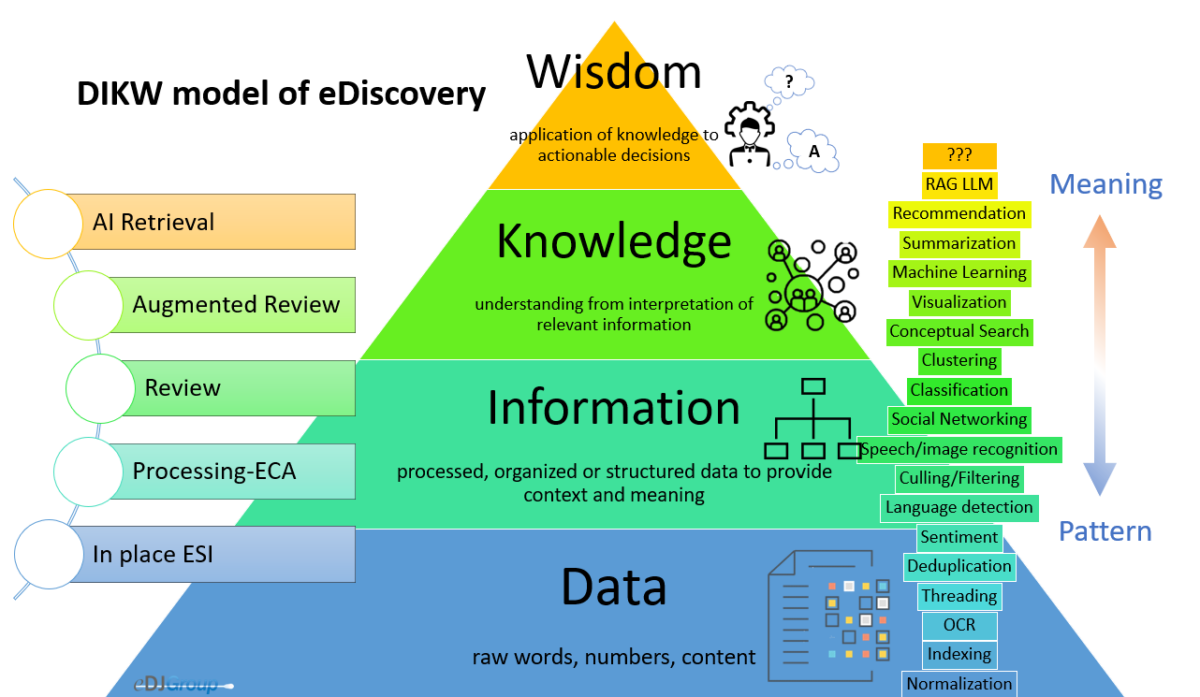 Ted Theodoropoulos recently proclaimed, “Enterprise search is dead!” He seems to have been referencing the new AI search methodologies and tools that provide answers instead of just links. That got me brainstorming about how our traditional and new generational tools apply to the DIKW pyramid model of retrieval. My analytics mentor Skip Walter hammered the differences between data, information and knowledge into my hard head way back in my Attenex days. It is still fascinating to see some marketing materials calling Dedup and threading ‘analytics’. So how do retrieval functions align with the Data-Information-Knowledge-Wisdom model?
Ted Theodoropoulos recently proclaimed, “Enterprise search is dead!” He seems to have been referencing the new AI search methodologies and tools that provide answers instead of just links. That got me brainstorming about how our traditional and new generational tools apply to the DIKW pyramid model of retrieval. My analytics mentor Skip Walter hammered the differences between data, information and knowledge into my hard head way back in my Attenex days. It is still fascinating to see some marketing materials calling Dedup and threading ‘analytics’. So how do retrieval functions align with the Data-Information-Knowledge-Wisdom model?
I tend to break the approaches into meaning vs. pattern based. Until TAR/machine learning, our analytic technologies focused on organizing raw data and reducing irrelevant content. Even using machine learning to prioritize and identify key evidence was all about cost/time reduction. Now we are testing nacent artificial technologies like RAG to deliver generative ‘answers’ and higher level insights to datasets from simple query prompts. While that does not comprise ‘wisdom’ in my eyes, it does augment human decisions and understanding in new ways.
For those wanting a more detailed comparison of the two primary approaches, this Copilot prompt response was pretty spot on to a non-academic in the tech trenches. As always, verify any AI generated content before relying on it.
Knowledge-Based AI
Knowledge-Based AI focuses on representing and utilizing knowledge to perform tasks. This approach involves encoding human knowledge into a form that AI systems can understand and reason with. Key aspects include:
- Knowledge Representation:
- Reasoning and Inference:
- AI systems use logical reasoning to draw conclusions from the knowledge they possess.
- Techniques like semantic networks, frames, and ontologies help in organizing and processing knowledge2.
- Applications:
Information-Based AI
Information-Based AI focuses on processing and analyzing large volumes of data (information) to identify patterns and make predictions. This approach is often associated with machine learning and data-driven techniques. Key aspects include:
- Data Processing:
- AI systems analyze raw data to extract useful information.
- Techniques like statistical analysis, clustering, and classification are commonly used3.
- Learning from Data:
- Machine learning algorithms learn patterns and relationships from data without explicit programming.
- Deep learning, a subset of machine learning, uses neural networks to process vast amounts of information and make complex predictions4.
- Applications:
Contrasting the Approaches
- Knowledge vs. Information:
- Knowledge-Based AI: Emphasizes structured, human-like understanding and reasoning. It relies on explicit knowledge encoded in a way that AI systems can use to make decisions.
- Information-Based AI: Focuses on extracting insights from unstructured data. It relies on statistical and computational methods to process and learn from information.
- Reasoning vs. Learning:
- Knowledge-Based AI: Uses logical reasoning to infer new knowledge from existing knowledge.
- Information-Based AI: Uses learning algorithms to identify patterns and make predictions based on data.
- Complexity and Flexibility:
- Knowledge-Based AI: Can handle complex reasoning tasks but may struggle with unstructured data.
- Information-Based AI: Excels at processing large datasets and identifying patterns but may lack deep understanding without structured knowledge.
Greg Buckles wants your feedback, questions or project inquiries at Greg@eDJGroupInc.com. Book a free 15 minute ‘Good Karma’ call if he has availability. He solves problems and creates eDiscovery solutions for enterprise and law firm clients.
Greg’s blog perspectives are personal opinions and should not be interpreted as a professional judgment or advice. Greg is no longer an investigative journalist and all perspectives are based on best public information. Blog content is neither approved nor reviewed by any providers prior to being published. Do you want to share your own perspective? Greg is looking for practical, professional informative perspectives free of marketing fluff, hidden agendas or personal/product bias. Outside blogs will clearly indicate the author, company and any relevant affiliations.
Greg’s latest nature, art and diving photographs on Instagram.
[instagram-feed num=1 imageres=thumb showfollow=true

